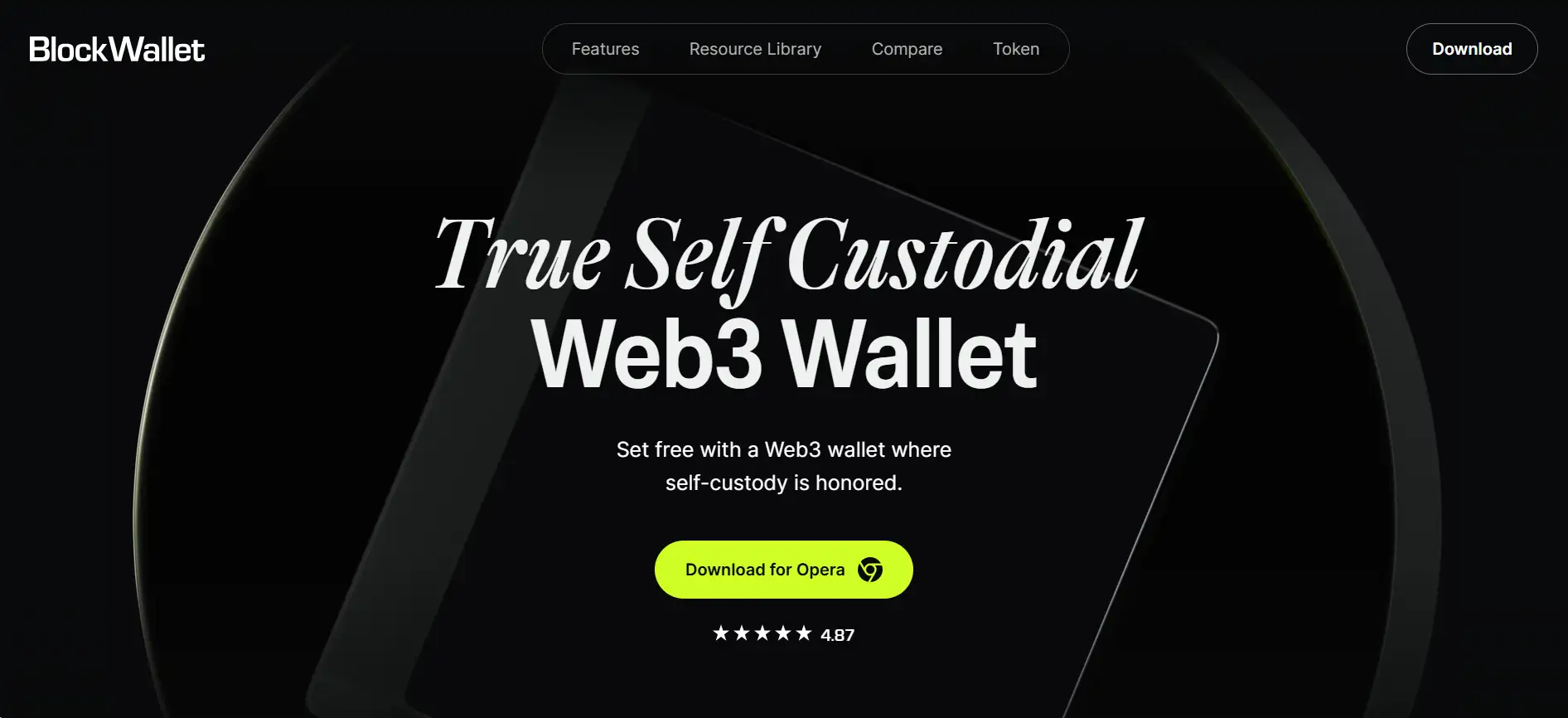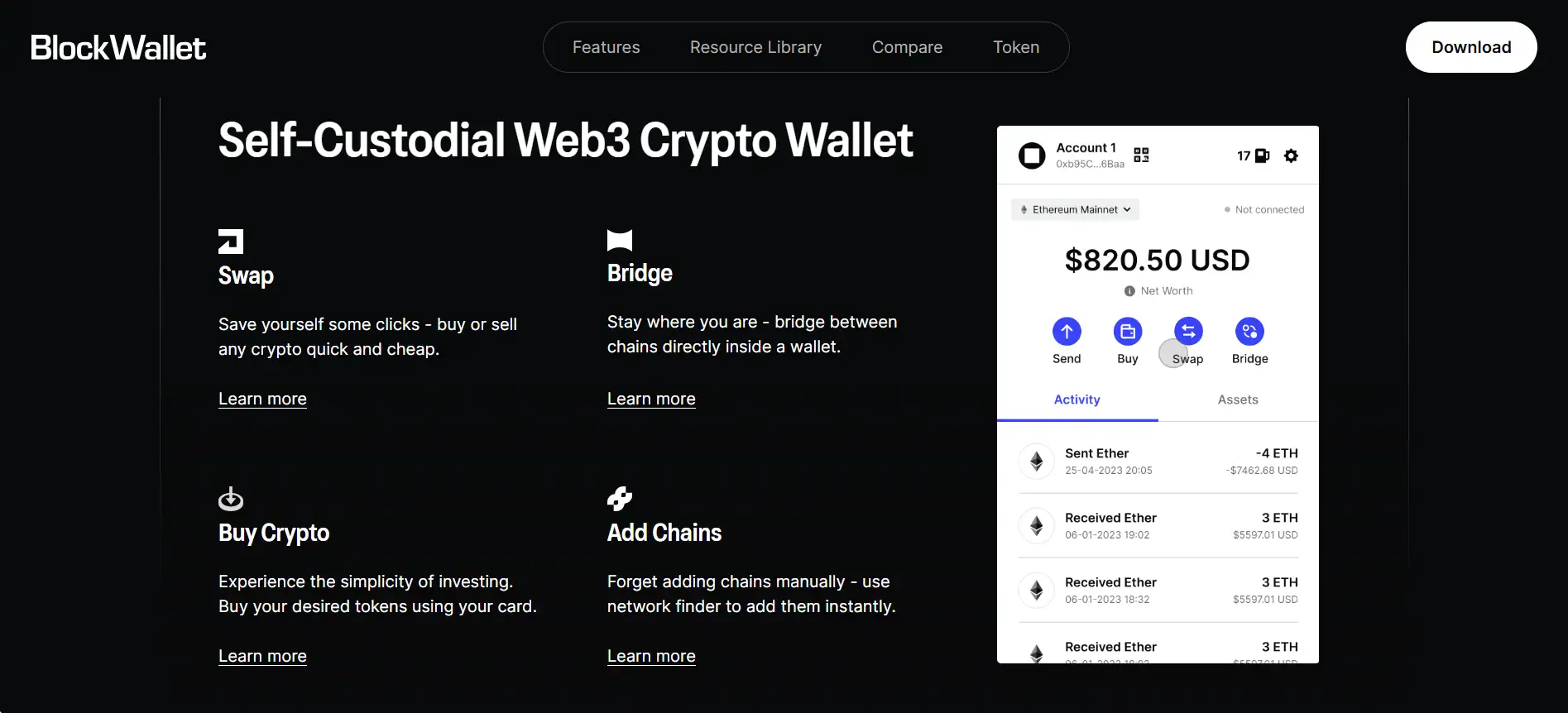About BlockWallet
BlockWallet is a secure and privacy-centric Web3 wallet designed for users who demand full control over their digital assets without compromising on anonymity. Built with a focus on self-custody, BlockWallet eliminates the risks associated with centralized exchanges by ensuring that users maintain ownership of their keys and data at all times.
Unlike traditional wallet solutions that may collect data or offer minimal privacy tools, BlockWallet empowers individuals with advanced privacy protections, including non-tracking architecture, secure bridging and swapping, and support for hardware wallets. By prioritizing transparency, the project publishes its source code and undergoes regular third-party audits. This makes BlockWallet a preferred choice for privacy advocates, developers, and decentralized finance (DeFi) users who value both usability and discretion.
BlockWallet is more than just another Web3 browser extension wallet; it's a powerful tool designed to put users in complete control of their crypto journey. Originating as a solution to combat tracking and censorship risks faced by users of mainstream wallets, BlockWallet was engineered to support self-custody, privacy-first operations, and high-performance DeFi interactions. It is available as an extension for Chromium-based browsers including Chrome, Edge, Opera, and Brave, and recently extended support to Firefox.
One of its standout features is the network-agnostic compatibility. Users can instantly connect to Ethereum, zkSync, Polygon, Fantom, Optimism, Avalanche, Arbitrum, BNB, Gnosis, and many more via an intuitive Quick Network Finder tool—eliminating the need for manual setup. BlockWallet supports in-wallet swaps, cross-chain bridges, and fiat onramps, allowing users to buy crypto with a card and move assets seamlessly across chains.
What distinguishes BlockWallet is its infrastructure. Unlike most wallets that rely on congested public RPC nodes, BlockWallet leverages exclusive nodes for faster, more reliable performance. It includes a failover system that ensures smooth operation by switching to backup nodes if the primary fails. The wallet also intercepts sensitive request metadata (like IP addresses), strips unnecessary details, and only relays what's essential—ensuring maximum privacy.
The wallet is fully open source and has been audited by top-tier firms such as Cure53, Least Authority, and X41 D-Sec. These audits help verify that there are no backdoors or security vulnerabilities. BlockWallet also gives users control over smart contract allowances, allowing them to revoke token approvals—protecting against common DApp exploits.
Competing wallets in the space include MetaMask, Rabby Wallet, and XDEFI Wallet, but BlockWallet differentiates itself by placing privacy and performance at the forefront. The team’s commitment to decentralization, security, and community-driven development makes it an essential tool in the Web3 toolkit.
BlockWallet provides numerous benefits and features that make it a standout project in the self-custodial wallet landscape:
- Self-Custody by Design: You retain full control of your private keys and crypto assets at all times.
- Privacy Infrastructure: Uses a privacy-preserving relay system to hide user data from node providers.
- Built-in Swap & Bridge: Enables direct in-wallet token swaps and cross-chain bridging without leaving the interface.
- Quick Network Finder: Add new blockchains in one click, with instant support for Ethereum, zkSync, Avalanche, and more.
- Secure Infrastructure: Access to exclusive RPC nodes with automatic failover systems for performance and reliability.
- Hardware Wallet Support: Integrate with Ledger and Trezor for an added layer of security.
- Open Source & Audited: Transparent codebase and regular third-party audits by Cure53, Least Authority, and others.
- No Tracking: No collection of personal information, not even your public address.
Getting started with BlockWallet is simple, fast, and secure. Here's how to begin your journey with self-custodial privacy:
- Choose Your Browser: Make sure you’re using a Chromium-based browser like Chrome, Brave, Edge, or Opera—or download the new Firefox-compatible version.
- Visit the Official Site: Go to BlockWallet.io and click the "Download" button for your browser.
- Install the Extension: Follow the prompts to install the wallet via the Chrome Web Store or Firefox Add-ons Marketplace.
- Create or Import a Wallet: Start fresh with a new wallet or import your existing one using a secure recovery phrase.
- Enable Features: Configure your wallet settings, enable built-in swaps, bridges, and hardware wallet support as needed.
- Explore the Ecosystem: Use the integrated tools to manage assets, explore DApps, revoke token allowances, or track gas fees—all from within BlockWallet.
BlockWallet FAQ
Yes, BlockWallet is designed to keep your public address private until you choose to share it. Many traditional wallets expose your wallet address to every website you visit—even before you connect. BlockWallet avoids this by only revealing your address when you explicitly approve a connection request. This preserves your on-chain identity privacy and keeps unsolicited data exposure to a minimum.
BlockWallet includes a failover system that automatically detects RPC failures and switches to a backup node provider in real time. This ensures uninterrupted access to the blockchain, without the user having to manually reconfigure settings. It's part of the project’s focus on delivering reliable Web3 access, especially during high network congestion or provider outages. You can explore this feature in action at BlockWallet.io.
With BlockWallet’s Quick Network Finder, users can add new blockchain networks like Arbitrum, zkSync, or Fantom with a single click—no more searching for chain IDs or RPC URLs. This tool detects and configures supported networks automatically, streamlining your onboarding into any ecosystem. This approach reduces user error and enables instant multi-chain setup. Learn more about this feature at BlockWallet.io.
Yes. Unlike many wallet bridges that expose sensitive user metadata, BlockWallet’s bridging tools are designed with identity protection in mind. The wallet relays transaction data through its privacy infrastructure, removing unnecessary personal identifiers like IP addresses before they hit the chain. This enables a more secure and private cross-chain experience that’s rarely seen in other wallets. Try this feature at BlockWallet.io.
Absolutely. BlockWallet includes a Token Allowance Revoke tool, allowing users to view and revoke token approvals given to DApps. This is a major defense mechanism against smart contract exploits that drain user wallets through forgotten or unlimited token permissions. By regularly checking allowances, users maintain granular control over token access. The feature is integrated directly into the wallet UI at BlockWallet.io.
You Might Also Like












